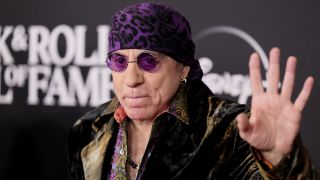Steven Van Zandt is concerned for the state of the world, admitting that he thinks the planet is "in the danger zone".
“I’m concerned for the first time, actually,” the E Street Band legend, and former The Sopranos star tells The Guardian in a new interview. “This insanity in the Middle East has put things in the danger zone for the first time. It was inconceivable that [Donald] Trump could possibly win again until recently and, now, unfortunately, it’s a possibility. We’re living in an insane asylum, frankly. I keep asking: where are the tough good guys? I don’t see too many of them.”
The guitarist was speaking to The Guardian ahead of the release of Stevie Van Zandt: Disciple, an HBO documentary (streaming now in the US on Max) in which peers including Bruce Springsteen, Paul McCartney, Pearl Jam's Eddie Vedder, U2 frontman Bono, Peter Gabriel and Joan Jett speak about his life, music and activism.
In the interview, the 73-year-old musician also speaks about an incident in South Africa which inspired him to write the 1985 anti-apartheid anthem Sun City, recorded by all-star ensemble Artists United Against Apartheid, a collective which included Bob Dylan, Rolling Stones Keith Richards and Ronnie Wood, Bono, Lou Reed, Run-DMC, Herbie Hancock, Joey Ramone and more.
“I was in a cab and a Black guy stepped off the kerb and the cab driver swerved to try and hit him,” Van Zandt recalls. “He [the driver] says, ‘Fucking kaffir’, which of course was the Afrikaans word for [N-word]. I couldn’t quite believe what I’d just seen – whoa! let me out.
“At that moment it became more than an intellectual exercise, more than just another subject I was going to write about in my next album. At that point I became an activist. There ain’t no fixing this. There ain’t no reform that’s going to fix this. These guys have got to go.”
Black Sabbath and Queen were among the bands who played in apartheid-era South Africa during the cultural boycott of the country.
In 2021, talking to Classic Rock, Queen's Roger Taylor admitted that, with hindsight, the band's nine shows in Sun City in 1984 were most likely a "mistake".
“We went with the best possible intentions, actually,” he insisted. “We didn’t make any money out of it. I remember Brian went to award some of the prizes at the Soweto festival. We went with the best intentions, but I still think it was kind of a mistake.”

